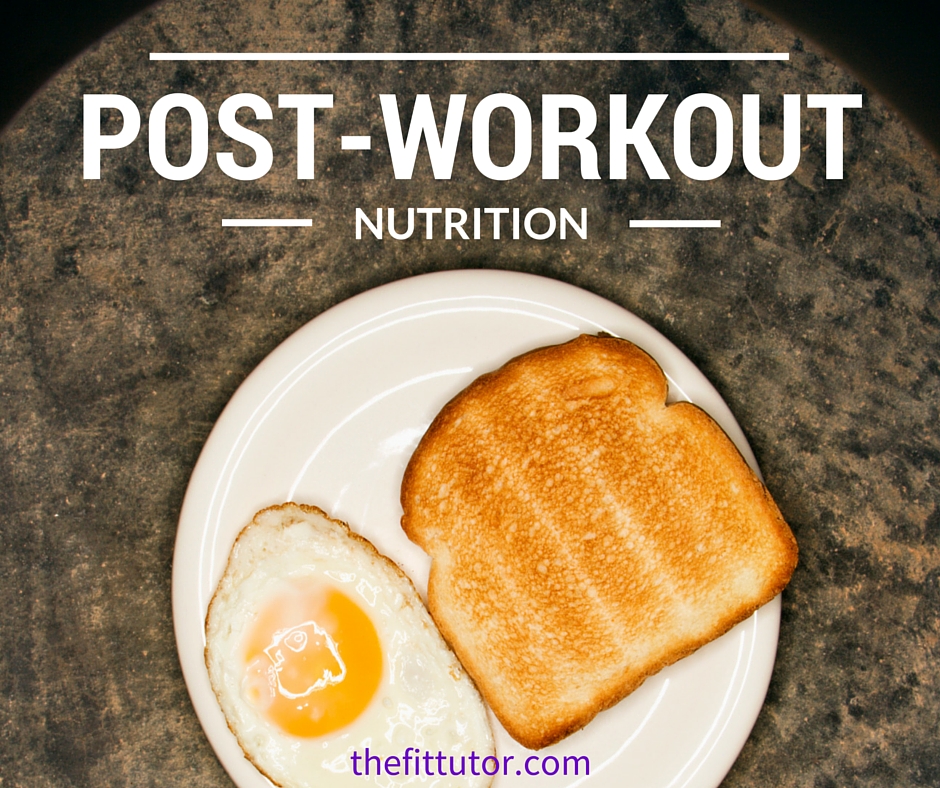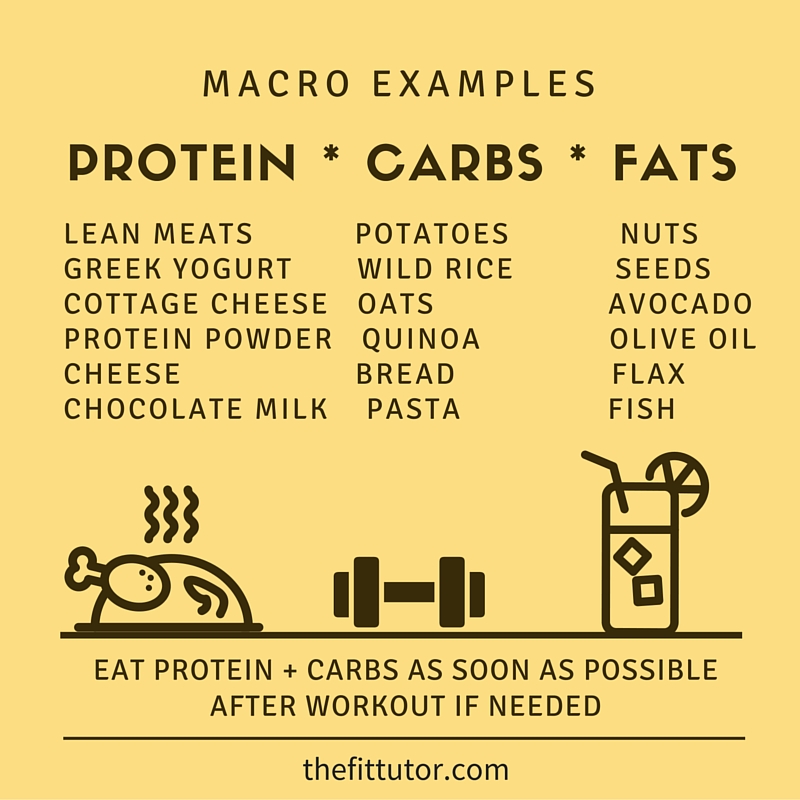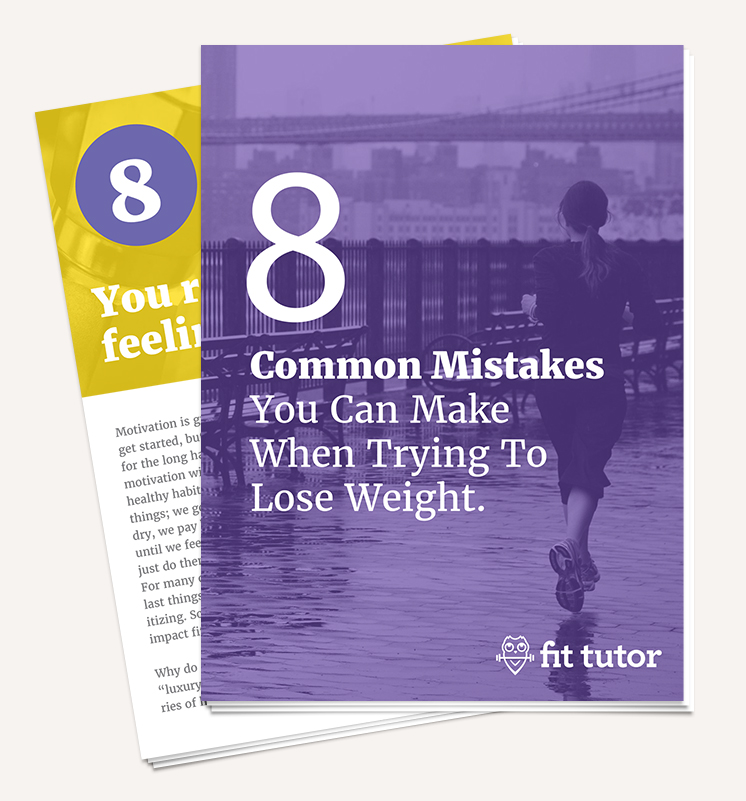Nutrient timing, carb cycling, macro ratios, and calorie counting are all enough to make one’s head explode. For the average exerciser, post-workout nutrition can be simple. Read on for some ideas on how to improve yours!

Why Is Post-Workout Nutrition Important?
During strenuous exercise (ex: weight lifting, cardio > 45 minutes, high intensity intervals) your muscles become damaged, drained of energy, and in need of repair. Your muscle fibers are broken down during your workout and are rebuilt with new, stronger protein and fibers. This is how your muscles grow stronger and more efficient. If you aren’t eating the right things and in the right amounts, your muscles could be broken down but not repaired and your results could come to a standstill.
Eating the right things before and after you exercise can help improve your body composition, performance, and recovery. It also helps repair muscle fiber damage, prevents injuries, increases your strength, and helps replenish your energy stores. With post-workout recovery improved, you should have less muscle soreness. Other benefits include improved immune function and bone density, and decreased inflammation and stress hormone response. And two thumbs up for post-workout nutrition improving your body’s ability to utilize fat. Hooray!
So now that we agree post-workout nutrition is important, let’s focus on
Timing
Does timing actually matter? Yes it does, but for the average exerciser it can be simple!
Your body deals with nutrients differently depending on your activity level. After a workout, your metabolism increases as your body repairs damage and restocks fuel reserves. The time period within 2-3 hours of your workout is referred to as the coveted “window of opportunity.”
Window of Opportunity
Right after your workout, your muscles are able to accept nutrients more readily- especially ones that stimulate muscle strength, growth, and repair. Most people should eat as soon as possible after a workout. The sooner the better, and don’t drift into that 3rd hour of the window unless you have no other choice. Failure to eat within this time frame can slow recovery and decrease your results.
Who do I mean by “most people”? You might not need to focus on post-workout nutrition if your workouts aren’t very long or strenuous, and you eat regular well-balanced meals. If you had protein and carbs before your workout and/or are trying to lose weight, you might not need anything after.
Liquid vs. Whole Foods
I usually recommend eating only whole foods, but when it comes to timing, there’s evidence that liquid nutrition might be digested and used faster. A whole food meal could take hours to digest, so you might miss the window.
If a real, whole food meal works best with your schedule and is what you prefer, go for it. Just try to make sure your previous meals and/or pre-workout nutrition are enough to help with recovery. If you’re not that hungry after your workout, try a protein shake or BCAA drink to accelerate recovery and absorption of nutrients. Do what works best for you. I personally struggle to get enough protein, so I have a protein shake after each strength training workout!
Macros Matter
Unless you have far-reaching physique or endurance goals, you don’t need to count your macros. It’s good to be aware of what you’re eating though, and shoot for a post-workout snack or meal of mostly protein and carbs.
Protein should be readily available in your body to help repair your muscles. After a workout, your muscles’ insulin sensitivity is increased so your body can use carbs more efficiently. Consuming carbs will also help replenish your energy stores. Fats can slow digestion, so they are best consumed during other meals or snacks instead of right after a workout. However, if it doesn’t bother your stomach, go ahead and eat fats, just make sure you get your protein and carbs!

How Much
In general, women should consume 20-30g of protein and men should consume 40-60g at each meal. If eating whole foods, a palm-sized portion of protein is around 20g.
There’s recent data that indicate 20g of protein is all you really need after a workout to maximally stimulate protein synthesis and muscle repair. If you eat well-rounded meals and get enough protein in otherwise, you can aim for 20g post-workout.
You should eat your largest meal of the day after a workout, if possible. If you’re opting for a whole food meal, Precision Nutrition recommends your plate should be half protein and half veggies, along with a cupped-handful of carbs. Don’t forget the importance of plate size- if you’re smaller or trying to lose weight choose a smaller plate.
If weight loss is your top priority, an energy deficit (burning more than consuming) is going to be more important than specific post-workout nutrition. Depending on the timing of your workout and meals, a BCAA drink or a lower calorie protein drink (ex: protein powder mixed with 30 cal almond milk or water) would be a better option.
Examples of Post-Workout Nutrition
Remember that not all of your work goes into your workout. To really get the results you want, you need to put some effort into the kitchen! Here are some examples of good post-workout foods:
Snacks/Shakes:
- Fruit smoothie + protein powder
- Banana + organic nut butter
- Tuna + crackers
- Jerky + dried fruit
- Greek yogurt + cereal (1/2 cup) or fruit
- Hard-boiled egg + berries
- Kefir or organic chocolate milk
- Fruit + nuts (1/4 cup)
- Cottage cheese + crackers (opt for organic whole wheat, nut, or rice based)
- Chocolate almond milk + protein powder
*Your body may react differently to carbs from fruit vs other carbs. Pay attention and adjust accordingly.
Meals:
- Burrito with meat, beans, rice, and veggies
- Wrap with meat and veggies
- Chicken + sweet potatoes + kale
- Salmon + squash + side salad
- Veggie omelete
- Stir fry
- Meatloaf muffins (turkey or beef) + quinoa + broccoli
- BLT on Ezekiel bread
- On-the-go Super Shake
Pick a few options from this list that might work for you. The important thing is paying attention to your body. Try a few different things and take note of how you feel. What you eat is just as important as your workout, so take measurements, track your weight, or take biweekly photos to see improvement. If you’re not seeing results, chances are it’s your nutrition!
The Fit Tutor now offers nutrition coaching, as well as workouts that will get you results! Sign up for your membership today. Learn more about our new Nutrition Course HERE.
Let me know what questions you have!
Allison
Sources/Further Reading:
- Precision Nutrition: All About Post-Workout Nutrition & Workout Nutrition Explained
- The Fit Tutor: 10 Easy Pre-Workout Snacks
- Breaking Muscle: Real World Advice for Post Workout Nutrition
- Men’s Fitness: The Fit 5: Pre and Post Workout Nutrition
- The Fit Tutor: Why You Should Lift Weights
- The Fit Tutor: Your Protein Needs, Simplified!


I forget what BCAA drink means. Thanks for a great article
Branched-Chain Amino Acids- for you though I would recommend protein drinks or powder instead of that :)
Stopping by from Anti-Procrastination Tuesday. This is great advice! I am saving this for reference later, I just started my fitness journey and can use all the tips I can get. Have a great day!
Awesome! Thanks for stopping by Angela! We have workouts and nutrition coaching for busy women- I’m happy to help if you have any questions! :)